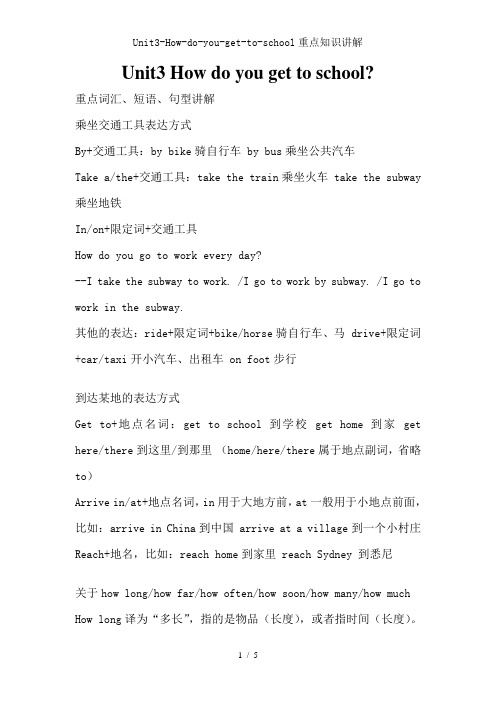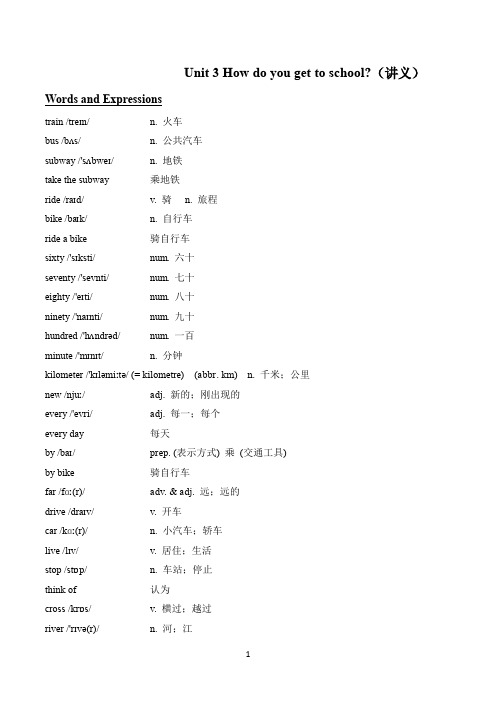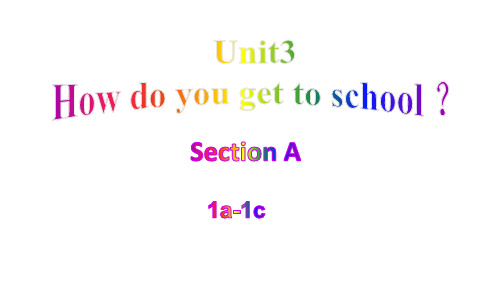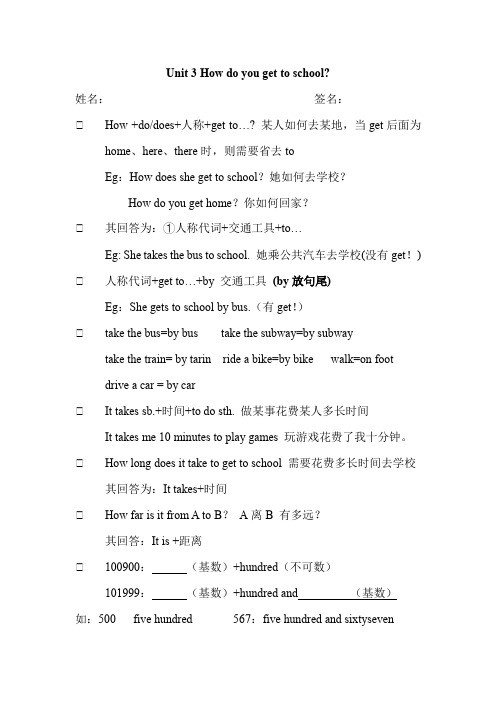Unit3.how do you get to school
Unit3-How-do-you-get-to-school重点知识讲解

Unit3 How do you get to school?重点词汇、短语、句型讲解乘坐交通工具表达方式By+交通工具:by bike骑自行车 by bus乘坐公共汽车Take a/the+交通工具:take the train乘坐火车 take the subway 乘坐地铁In/on+限定词+交通工具How do you go to work every day?--I take the subway to work. /I go to work by subway. /I go to work in the subway.其他的表达:ride+限定词+bike/horse骑自行车、马 drive+限定词+car/taxi开小汽车、出租车 on foot步行到达某地的表达方式Get to+地点名词:get to school到学校 get home到家 get here/there到这里/到那里(home/here/there属于地点副词,省略to)Arrive in/at+地点名词,in用于大地方前,at一般用于小地点前面,比如:arrive in China到中国 arrive at a village到一个小村庄Reach+地名,比如:reach home到家里 reach Sydney 到悉尼关于how long/how far/how often/how soon/how many/how much How long译为“多长”,指的是物品(长度),或者指时间(长度)。
当询问时间时,其答语为:About/For+一段时间。
How long does it take to get to school? --About 15 minutes. How long is this ruler? --About 20 centimeters.How far译为“多远”,指的是路程距离的远近。
Unit 3 How do you get to school笔记

Unit 3 How do you get to school?1,常用特殊疑问词用法总结How :如何,怎样(方式)how long :多长(时间)答语常用For+时间段”how far:多远(距离)答语常用“(It’s +)数词 +miles/ meters/ kilometers”或者it is ten minutes’walk.how often:多久一次(频率)答语常用“Always/ often/ every day/…”或“次数+时间”等表频率的状语How soon:多快,多久以后,常用在将来时中。
答语常用“in +时间段”how many:多少(接可数名词) how much:(接不可数名词)why:为什么(原因) what:什么 when:何时who:谁 whom:谁(宾格)(针对宾语提问也可用who) whose:谁的2,交通方式的不同表达方式●用介词。
在句子中做方式状语。
①by +交通工具名词(中间无需任何修饰)By bus/ bike/ car/ taxi/ ship/ boat/ plane/ subway/ train……②in/ on +冠词/物主代词/指示代词 +交通工具名词In a/ his/ the car/taxiOn a/ his/ the bus/ bike/ship/ train/ horse/ motorbike③on foot 步行=walk to =go to +地点+on foot●用动词。
在句子中做谓语。
①take + a/ the +交通工具名词take a bus/ plane/ ship/ train②动词+to+地点Walk/ride/drive/fly to +地点名词=go to +地点+介词短语Walk to school=go to school on foot③ride a bike/horse 骑车、马④walk/ drive/ ride/ fly to……(后面接here,there,home等地点副词时,省略介词to。
Unit 3 How do you get to school课文及语法重点

Unit 3 How do you get to school?(讲义)Words and Expressionstrain /treɪn/ n.火车bus /bʌs/ n. 公共汽车subway /'sʌbweɪ/ n. 地铁take the subway 乘地铁ride /raɪd/ v. 骑 n. 旅程bike /baɪk/ n. 自行车ride a bike 骑自行车sixty /'sɪksti/ num. 六十seventy /'sevnti/ num. 七十eighty /'eɪti/ num. 八十ninety /'naɪnti/ num. 九十hundred /'hʌndrəd/ num. 一百minute /'mɪnɪt/ n. 分钟kilometer /'kɪləmiːtə/ (= kilometre) (abbr. km) n. 千米;公里new /njuː/ adj. 新的;刚出现的every /'evri/ adj. 每一;每个every day 每天by /baɪ/ prep. (表示方式) 乘(交通工具)by bike 骑自行车far /fɑː(r)/ adv. & adj. 远;远的drive /draɪv/ v. 开车car /kɑː(r)/ n. 小汽车;轿车live /lɪv/ v. 居住;生活stop /stɒp/ n. 车站;停止think of 认为cross /krɒs/ v. 横过;越过river /'rɪvə(r)/ n. 河;江many /'meni/ adj. & pron. 许多village /'vɪlɪdʒ/ n. 村庄;村镇between /bɪ'twiːn/ prep. 介于……之间between…and…在……和……之间bridge /brɪdʒ/ n. 桥boat /bəut/ n. 小船ropeway /'rəup,weɪ/ n. 索道year /jɪə/ n. 年;岁afraid /ə'freɪd/ adj. 害怕;畏惧like /laɪk/ prep.像;怎么样villager /'vɪlɪdʒə(r)/ n.村民leave /liːv/ v.离开dream /driːm/ n.梦想;睡梦v.做梦true /truː/ adj.真的;符合事实的come true 实现;成为现实Dave /deɪv/ 戴夫(男名)Role-playLisa:Hey, Jane. Is this your new bike?Jane:Yes. I ride it to school every day. How do you get to school? Lisa:I usually take the bus.Jane:How far is it from your home to school?Lisa:I’m not sure…about 10 kilometers? The bus ride takes about20 minutes. How long does it take you to get to school? Jane:About 15 minutes by bike. It’s good exercise.Lisa:Yeah. Well, have a good day at school.Jane:You, too.练一练:将问句和答语连起来How does Mike get to school? How long does it take to get home? How far is it from here? It’s five kilometers. He rides his bike. About 15 minutes.Grammar FocusHow do you get to school?I ride my bike.How does she get to school?She usually takes the bus.How long does it take to get to school?It takes about 15 minutes.How far is it from your home to school?It’s only about two kilometers.Does Jane walk to school?No, she doesn’t. She goes by bike.Do they take the bus to school?No, they don’t. They walk.用适当的介词或者动词填空1.She often goes to work _______ bus.2.His father _______ the train to Beijing.3.Many people ________ (驾车)to work now.4.My mother comes here _______ train.5.Tom goes to school _______ his bike.6.Lucy often gets to school _______ her father’s car.7.I go to work ______ foot every day.ReadingRead the passage and answer the questions.Crossing the River to SchoolHow do you get to school? Do you walk or ride a bike? Do you go by bus or by train? For many students, it is easy to get to school. But for the students in one small village in China, it is difficult. There is a very big river between their school and the village. There is no bridge and the river runs too quickly for boats. So these students go on a ropeway to cross the river to school.One 11-year-old boy, Liangliang, crosses the river every school day. But he is not afraid. “I love to play with my classmates. And I love my teacher. He’s like a father to me.”Many of the students and villagers never leave the village. It is their dream to have a bridge. Can their dream come true?1.How do the students in the village go to school?____________________________________________________2.Why do they go to school like this?____________________________________________________3.Does the boy like his school? Why?____________________________________________________4.What is the villagers’ dream? Do you think their dream cancome true?____________________________________________________Exercises一、词汇填空1.My father usually takes the s__________ to work.2.It is three k__________ from my home to school, so I usually take the bus to school.3.I often r__________ my bike to school.4.There is a b__________ over the river.5.Today I sit b__________ Lily and Lucy.6.It’s not easy __________ (work) out the problem.7.There are __________ people and __________ water on the street. (much / many)8.There are three __________ (百) teachers in our school.9.My __________ (梦想) is to be a singer.10.Most of the girls ____________________ (害怕) dogs.11.The old woman lives in a small __________ (村庄).12.__________ (越过) the river and you will get there.二、单项选择( )13.—_____ do you get to school?—_____ my parent’s car.A. How; InB. How long; OnC. How far; InD. How; by( )14.—How does Mr. Smith go to work?—He usually______.A. by bus to workB. take the busC. goes to work to take a busD. goes to work on a bus( )15.—_____ it take you to walk from your home to your office?—At least(至少) 40 minutes.A. How far isB. How much time isC. How doesD. How long does( )16.—_____ is it from your home to school?—It’s three miles.A. How oldB. How farC. How muchD. How long( )17.It _____ about 15 minutes ____ the theatre.A. take; walkB. takes; to walkC. takes; to walk toD. take; to walk( )18.It is difficult ______ English well.A. learnB. to learnC. learningD. learns( )19.He is a ______ boy.A. five years oldB. five-year-oldC. five-years-oldD. five year old三、用所给的单词组短语,并用短语的适当形式填空20.to, school, get to, does, how long, take, it________________________________________________?21.school, your, from, it, is, how far, home, to________________________________________________?22.you, to, walk, do, school________________________________________________?23.ride, their bikes, do, school, your friends, to________________________________________________?24.He often goes to work by car.(就划线部分提问)__________ __________ he often __________ to work?25.It is four miles from my home to school. (就划线部分提问)__________ __________ is it from your home to school?26.It takes me twenty minutes to get home from school. (就划线部分提问)__________ __________ __________ it __________ you to get home from school?27.我认为她的梦想能够实现。
人教版七年级英语下册【词汇秒记】Unit3_How_do_you_get_to_school?

Unit 3 How do you get to school?*交通出行类1.train n.火车2.bus n.公共汽车3.subway n.地铁4.bike n.自行车5.ride v.骑n.旅程6.by prep.(表示方式)乘(交通工具)7.drive v.开车→ driver司机8.car n.小汽车;轿车9.live v.居住;生活10.stop n.车站;停止11.cross v.横过;越过12.ropeway n.索道13.river n.河;江14.village n.村庄;村镇→ villager n.村民15.bridge n.桥16.boat n.小船*描述距离类17.sixty num六十18.seventy num.七十19.eighty n.八十20.ninety n.九十21.hundred nm,一百22.minute n.分钟23.far adv.&adj远;远的24.kilometer(= kilometre)n.千米;公里其他万能词汇25.new adj新的;刚出现的→(反义词)old adj.年老26.every adj.每一;每个27.many adj.&pron.许多28.between prep.介于……之间29.year n.年;岁30.afraid adj害怕;畏惧31.like prep.像;怎么样32.leave v.离开33.dream n.梦想;睡梦v.做梦34.true adj.真的;符合事实的1.take the subway 乘地铁2.ride a bike 骑自行车3.every day 每天4.by bike 骑自行车5.think of 认为6.between…and….在……和……之间e true 实现;成为现实1.How do you get to school?你是怎样到学校的?2.How far is it from your home to school?从你家到学校有多远?—How long does it take you to get to school?你到学校花费多长时间?—About 15 minutes by bike.骑自行车大约需要15分钟。
Unit 3 How do you get to school-初中英语人教版七年级下册单元书面表达

Presentation
审题格式
①时态: 主要使用一般现在时 ②人称: 第一人称 ③框架结构: 书信格式 Dear Tom,
Thank you for your letter. Now I am writing to tell you about how I go to school…… …… Yours, friend
句型
1. Sb. go(es) to school by... 某人乘 …… 去上学。 2. It takes sb. some time to do sth. 某人花费多少时 间做某事。
3. It’s about ... kilometers from my home to school. 从我家到学校大约 …… 千米。
Unit3 How do you get to school? 单元话题写作
话题Pres分ent析ation
本单元以“谈论如何到达某地”为话题,要求同学们能描 述人们去上班或学生去上学所用的交通方式、路程、所花费 的时间、感受及对未来出行方式的憧憬。 写作要求:
1.能用“take the train/walk/ride a bike/drive a car/by subway/on foot…”描述使用的交通工具;
Dear Tom, How are you? Thank you for your last e-mail. I know how you
get to school. Now let me tell you how I get to school. I usually leave home at half past seven. First, I walk to the
Unit 3 How do you get to school初中英语人教版七年级下册 (6)

2 “by+交通工具”属固定介词短语,表示“乘坐、使 用某种交通工具”。如:
by bus 乘公交车 by train 坐火车 by bike 骑自行车 by air 坐飞机 by boat 乘船 请注意,英语中on foot表示“步行;走路”,而不 是by foot或on feet.
* walk to sp. = go to sp. on foot * ride a/the bike to sp. = go to sp. by bike
B: I ride my bike./ I get to school by bike.
A: How does Mary get to school?
take the train by train 乘坐火车
take a car
by car 乘坐小车
take the plane by plane 乘坐飞机
take the bus by bus 乘坐公车
take a boat
by boat 乘坐船
Make conversations.(编对话) A: How do you get to school?
A: How do you get to school?
B:
walk
ride my bike
to school.
A: How do you get to school? take the bus
B: take the subway to school.
take the train
A: How do you get to school? B:
B: She takes the subway toschool.
unit 3 How do you get to school

How long does it take you to get to school? It takes me 10 minutes to get to school by bus.
10 minutes
25 minutes
8 minutes
20 minutes
2 hours
12 minutes
two kilometers
注意: 在英语中,表示乘某种交通工具要用“by+交通工 具名称”这一介词短语。注:by后的名词一律用单数, 而且这一名词前一般不加冠词。 如:by bike / bus/ car/ train /subway by plane/air by boat/water by ship/sea 当交通工具名称前有“ a /the”时,不能再用“ by”, 要用“on” 或 “in” 。 如:on a (the) bus/bike/ train/subway in a plane/ship/taxi/car 但是,表示步行时,要用on foot.
Can you read?
分钟
10 minutes 25 minutes 15 minutes
千米,公里 44 kilometers 99 kilometers 55 meters
How long? Twenty-five minutes.
How far? Ten kilometers(公里).
米
注意: I ride my/ a bike to school. 当home, here, there I go to school by bike. I go to school on my bike. 作地点时, 不加to。
Linda takes the bus home.
Unit3Howdoyougettoschool?单元背诵人教版七年级英语下册

Unit 3 How do you get to school?姓名:签名:①How +do/does+人称+get to…? 某人如何去某地,当get后面为home、here、there时,则需要省去toEg:How does she get to school?她如何去学校?How do you get home?你如何回家?①其回答为:①人称代词+交通工具+to…Eg: She takes the bus to school. 她乘公共汽车去学校(没有get!)①人称代词+get to…+by 交通工具(by放句尾)Eg:She gets to school by bus.(有get!)①take the bus=by bus take the subway=by subwaytake the train= by tarin ride a bike=by bike walk=on footdrive a car = by car①It takes sb.+时间+to do sth. 做某事花费某人多长时间It takes me 10 minutes to play games 玩游戏花费了我十分钟。
①How long does it take to get to school 需要花费多长时间去学校其回答为:It takes+时间①How far is it from A to B?A离B 有多远?其回答:It is +距离①100900:(基数)+hundred(不可数)101999:(基数)+hundred and (基数)如:500 five hundred 567:five hundred and sixtyseven①hundreds of… 数百(+s)①It is good exercise. 它是一个不错的运动。
①Think of 认为;What do you think of+doing?你认为…怎么样?①For many students 对于很多学生来说①In one small village in China. 在中国的一个小村庄①The river runs too quickly 水流太快了①11yearold =11 years old(an eleven)①Between A and B 在A与B之间between you and me 在你和我之间①Be like =look like 看起来像①Dream e ture 梦想实现①be afraid of doing sth. =be afraid to do sth. 害怕做某事①too+adj. 太… too fun 太有趣了!so+adj. 如此…. So fun 如此有趣②①go on ropeway 坐索道②②leave the village 离开村庄②③at the bus stop在公共汽车站。
- 1、下载文档前请自行甄别文档内容的完整性,平台不提供额外的编辑、内容补充、找答案等附加服务。
- 2、"仅部分预览"的文档,不可在线预览部分如存在完整性等问题,可反馈申请退款(可完整预览的文档不适用该条件!)。
- 3、如文档侵犯您的权益,请联系客服反馈,我们会尽快为您处理(人工客服工作时间:9:00-18:30)。
I take a taxi. I take a taxi to school. = I go to school by taxi.
How do you
get to school?
take the plane
take the bus
take the train
take the car
take the ship
How far is it from the earth to the moon? 从地球到月亮有多远/ 间的联系,到底是提问什么。 How (2)how long询问“物体的长度或时间的长度”。例如: 或副词连用 many times a year相当于how How long is the Changjiang River?长江有多长? often( ; 2、明确询问时间的疑问词 3) how old询问“年龄”。例如: How old how are you? 你多大了? 之间的差别。 soon 询问的是 (4)how often询问“频率”。例如: 未来的时间,常用“ in+一段时间” How often do you go abroad?你多长时间出一次国? 来回答;而 how long常用“for+一 (5)how soon询问“多久以后(发生某事).例如: 段时间”来回答。 How soon can you come?你多快能赶来?
1. Review the words of the transportation In my ). grop, A ...to school. B (交通工具 gets to school C...to 2. Ask and answer the by... the way to a place(交通方式) withschool. your classmates. And I ...to school. 3. Listen to the tape, and imitate(模仿). 4. Preview.
How do you get to +地点?的用法
How do you get to +地点?用于询问对方到达某地的方式。特殊疑问词how表示 方式,意思是“怎么样”。例如: —How do you usually go to work?你通常怎样去上班? —I usually go by bue.我通常乘公共汽车去。(或I usually take the bus to work) 知识拓展:reach,get和arrive都有“到达”的意思: reach是及物动词,后须接地点名词做宾语。例如: I reach school at 7 o’clock.我七点到达学校。 get是不及物动词,接宾语时须与to连用;跟副词( here,there,home 要点提示: arrive at 表示 )时不加to。 例如: “到达(小的地方)”, The Black got to (=arrived in/reached)China 昨天布莱克一家到了中 arriveyesterday. in表示“到达(大的 国。 地方)”;arrive也可直接 arrive是不及物动词,接宾语时须与at或in 连用。例如: 跟表示地点的副词。 When did you arrive in(=reach/get to)Beijing? 你什么时候到达北京? I arrived at Beijing Station at 7:00 pm. 我晚上7点到达北京火车站。 I can arrive(=get)there on time. 我能准时到达那儿。
hot balloon
broom
I take (ride) the …to ...
bird
bee
How does he get to work ?
Yao Ming rides a bike to work every day. =Yao Ming gets to work by bike every day
By: Zhu Ning
--- It is like a train but goes under the ground( 地面 ).
--- a subway
--- It's not a bird, but it can fly far away in the sky.
--- a plane
= Zhang Weijian often gets to work by bus.
How does he get to work?
Zhou Jielun sometimes takes a train to work. Zhou Jielun sometimes gets to work by train.
I take the train. I get to school by train.
I take the ship. I get to school by ship.
I ride the bike.
I get to school by bike
I walk to school. I get to school on foot.
--- It is like a bike but goes much faster(快得多).
---a motorbike
I ride a bike. I ride a bike to school. = I go to school by bike .
I walk. I walk to school. = I go to school on foot .
I take the plane to school. =I go to school by plane.
How does Yao Ming get to work?(知者加速)
He often takes a car to work. =He often gets to work by car. =He often gets to work in her car. =He often drives to work.
A: How do you get to school?
B:
walk
ride a bike take a bus take a car take the subway take the train
to school.
=I go to school by +交通工具\ on foot.
I take (ride) the …to ...
小组互助:How does he get to school?
He walks to school.
He takes the bus to school.
How do they get to school?
They take the ship to school.
How does Bob get to school? He rides a bike to school.
2 walk的用法
walk为动词,表示“走,步行”。例如: We walk to school each day.=We go to school on foot every day.我们每 天走着去上学。(on foot是介词短语,在句中做状语。)
walk into the house走进屋子 walk about/around到处走走,散步 go walking in the park上公园去散步 walk away from从……走开 知识拓展: walk 做及物动词时,表示“遛(动物);陪着(某人)走”。 例如: walk the dog遛狗 I walkedherhome.我送她回家。
take the subway
ride a bike
I take the bus. I get to school by bus.
I take the taxi. I get to school by taxi.
I take the subway.
I get to school by subway.
How does he get to work?
Liu Xiang usually takes the subway to work.
பைடு நூலகம்
Liu Xiang usually gets to work by subway.
How did he get to the space(太空)?
Yang Liwei took a space ship to the space.
I take the train to school.
=I go to school by train.
I take the bus to school. =I go to school by bus.
I take the ship to school.
=I go to school by ship.
How does she get to work?
Liu Yifei often takes a car to work. =Liu Yifei often gets to work by car.
How does he get to work?
Zhang Weijian often takes a bus to work.
3 take的用法 take可以表示“乘,坐”某一交通工具。例如: My father usually takes a bus to work.我爸爸常坐公共汽车去上班。 Which bus do you often take?你经常乘哪路公共汽车?
知识拓展:take和by 的区别: take和by都有“乘,坐,搭(车、船)”之意。take是一个动词, 后面接具体的交通工具,且在表示该交通工具的名词前一般应有冠 词等修饰语。如take a bus/take the bus/take buses“乘公共汽车”。 而by是一个介词,它后面所跟的表示交通工具的名词前一般不可用 冠词等修饰语。如:by bike,by bue,by car,by train,by plane/air( 乘飞机),by ship/boat/sea/water(乘船);by短语在句中修饰动词 等做状语。比较: My mother takes the subway to work.=My mother goes to work by subway. 我妈妈乘地铁去上班。
